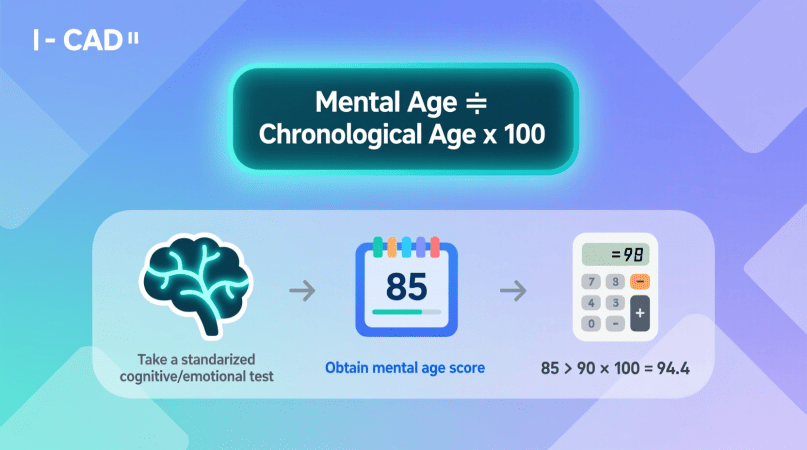
Most people know their biological age, but fewer consider their mental age—the measure of how your mind processes information, solves problems, and manages emotions compared to others. Understanding your mental age can reveal whether you think younger, older, or right in line with your chronological age.
In this guide, we’ll walk through the scientific methods psychologists use, show you how to interpret results, and explain what they mean for your daily life.
What Exactly Is Mental Age?
The term mental age was first introduced in the early 1900s by Alfred Binet, the creator of the first IQ test. Instead of looking only at how many years you’ve lived, mental age reflects how your thinking ability, reasoning skills, and emotional maturity compare with others.
- A higher mental age than your actual age suggests advanced maturity or cognitive ability.
- A lower mental age may reflect creativity, playfulness, or slower development in certain skills.
If you want a quick starting point, try our mental age calculator for an easy, fun snapshot.
Check results to interpret your scientifically calculated mental age score.
The Scientific Formula: Mental Age and IQ
The classic way to calculate mental age is through the IQ formula:
IQ= Mental Age / ChronologicalAge×100
Example: If a 20-year-old performs on par with the average 25-year-old, their IQ would be 125.
This formula was the foundation of early intelligence testing, though modern psychologists use updated methods like deviation IQ (used in WAIS and Stanford-Binet tests).
Read how to calculate your mental age online for a simple step-by-step version.
Beyond the Formula: Other Scientific Approaches
Psychologists now combine multiple measures to estimate mental age more accurately. Here are some commonly used methods:
1. Standardized Intelligence Tests
Tools like the Wechsler Adult Intelligence Scale (WAIS) compare your performance against a large sample of people your age. Instead of giving a single mental age, they measure multiple domains like memory, processing speed, and reasoning.
2. Emotional Intelligence & Maturity
Mental age isn’t just about logic. Emotional skills, such as empathy and self-regulation, are equally important. A practical way to explore this is through an emotional intelligence test that measures how you manage emotions in real-life situations.
3. Cognitive Processing Speed
Scientists also use reaction time tests—sometimes called mental chronometry—to estimate how quickly the brain processes information. Faster responses often align with “younger” cognitive functioning.
4. Psychological and Emotional Age
Your outlook and resilience also play a role. The psychological age test can reveal whether your worldview matches your biological age, while an emotional age test highlights how you respond to relationships and stress.
Learn how it compares to your real years in mental age vs chronological age.
Why Knowing Your Mental Age Matters
Understanding your mental age provides more than trivia—it can be a personal growth tool:
- Self-awareness: Recognize strengths and blind spots in decision-making.
- Improved communication: Adjust how you relate to people older or younger than you.
- Career and learning: Choose strategies that match your cognitive style.
- Health insights: Cognitive slowing may indicate areas to strengthen with mental exercises.
Example: Calculating Your Mental Age Step by Step
Let’s say you’re 30 years old and you complete a standardized assessment showing your reasoning skills match the average 35-year-old.
IQ= 35 / 30×100 = 116
Here, your mental age is 35, higher than your chronological age. This suggests stronger-than-average maturity and problem-solving ability.
Compare emotional and cognitive growth through mental age vs cognitive age.
Common Questions About Mental Age
Is mental age the same as IQ?
Not exactly. IQ is one way of expressing mental age, but psychologists now use broader measures.
Can mental age change?
Yes. Experiences, learning, and emotional growth all influence your results.
Are online mental age quizzes accurate?
They can provide fun insights, but only standardized tests under professional supervision are considered scientifically valid.
What’s the difference between mental and emotional age?
Mental age refers to reasoning and thinking ability, while emotional age reflects how you handle feelings and relationships.
- The scientific approach to scoring is explained in how to calculate your mental age scientifically.
- The formulas behind maturity estimates are described in our methodology.
- How cognition influences results is compared in mental age vs cognitive age.
- The difference between intelligence and maturity is discussed in mental age vs IQ test.
- The meaning of your final score is explained in how to interpret mental age test results.